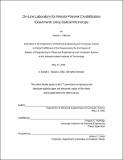| dc.contributor.advisor | Gregory C. Rutledge. | en_US |
| dc.contributor.author | Talavera, Daniel J. (Daniel Joseph), 1980- | en_US |
| dc.contributor.other | Massachusetts Institute of Technology. Dept. of Electrical Engineering and Computer Science. | en_US |
| dc.date.accessioned | 2005-05-19T15:30:29Z | |
| dc.date.available | 2005-05-19T15:30:29Z | |
| dc.date.copyright | 2003 | en_US |
| dc.date.issued | 2003 | en_US |
| dc.identifier.uri | http://hdl.handle.net/1721.1/16975 | |
| dc.description | Thesis (M.Eng.)--Massachusetts Institute of Technology, Dept. of Electrical Engineering and Computer Science, 2003. | en_US |
| dc.description | Includes bibliographical references (p. 88-89). | en_US |
| dc.description | This electronic version was submitted by the student author. The certified thesis is available in the Institute Archives and Special Collections. | en_US |
| dc.description.abstract | This thesis discusses the architecture of an on-line optical microscopy laboratory, or iLab, in which students remotely conduct and analyze polymer crystallization experiments using a polarized light microscope under controlled temperature conditions. The Polymer Crystallization iLab involves melting a polymer sample and subsequently cooling it down to a temperature below its melting point in order to study isothermal crystallization phenomena. By analyzing the rates of nucleation and crystallite growth, students can characterize the kinetics of crystallization. As melting the polymer erases any prior history of the sample, the experiment can be repeated numerous times without requiring intervention in the laboratory. The architecture was designed with the goal of replicating the real laboratory experience to the maximum extent possible. Streaming temperature data and images from the microscope are sent to a Java applet, allowing the student to view and interact with the experimental apparatus in real time. The Java applet client runs on any conventional web browser and provides considerable latitude to students conducting the experiment, while ensuring proper safeguards. Students can record and save images and related data to a server to perform analysis at a later date. The analysis can either be conducted remotely on the server or the images can be downloaded to the user's computer for local analysis. | en_US |
| dc.description.statementofresponsibility | by Daniel J. Talavera. | en_US |
| dc.format.extent | 89 p. | en_US |
| dc.format.extent | 1263117 bytes | |
| dc.format.extent | 1262835 bytes | |
| dc.format.mimetype | application/pdf | |
| dc.format.mimetype | application/pdf | |
| dc.language.iso | eng | en_US |
| dc.publisher | Massachusetts Institute of Technology | en_US |
| dc.rights | M.I.T. theses are protected by copyright. They may be viewed from this source for any purpose, but reproduction or distribution in any format is prohibited without written permission. See provided URL for inquiries about permission. | en_US |
| dc.rights.uri | http://dspace.mit.edu/handle/1721.1/7582 | |
| dc.subject | Electrical Engineering and Computer Science. | en_US |
| dc.title | On-line laboratory for remote polymer crystallization experiments using optical microscopy | en_US |
| dc.type | Thesis | en_US |
| dc.description.degree | M.Eng. | en_US |
| dc.contributor.department | Massachusetts Institute of Technology. Department of Electrical Engineering and Computer Science | |
| dc.identifier.oclc | 53826551 | en_US |
